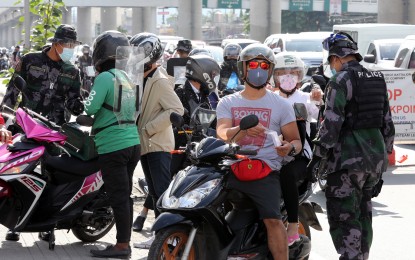
File photo
MANILA – The stability and continuity of the local government units’ (LGUs) response to the coronavirus disease 2019 (Covid-19) pandemic are expected following the implementation of month-long community quarantine in the country, Malacañang said on Tuesday.
This, after the Inter-Agency Task Force for the Management of Emerging Infectious Diseases (IATF-EID) extended the duration of quarantine classifications nationwide from two weeks to one month.
Presidential Spokesperson Harry Roque, also acting as IATF-EID spokesperson, said it is “very difficult” to implement health measures against Covid-19 in every two weeks.
“Minabuti na po ng IATF na gawing isang buwan para magkaroon ng stability ang iba’t ibang mga local na pamahalaan. Napakahirap po kasi kung magbabago ang rules every two weeks (The IATF decided to [impose a month-long community quarantine] to ensure the stability of local government’s [Covid-19 response]. It’s very difficult to change the rules every two weeks),” Roque said in a virtual presser.
In a public address delivered Monday night, Duterte approved the IATF-EID’s recommendation to put Iligan City under a more restrictive modified enhanced community quarantine (MECQ) from September 1 to 30.
On the other hand, Metro Manila, the provinces of Bulacan and Batangas, and the cities of Bacolod are placed under a more relaxed general community quarantine (GCQ) until September 30.
Modified GCQ, the least restrictive community quarantine, is implemented in the rest of the country.
In the past months, the IATF-EID has recommended the imposition of nationwide community quarantine every two weeks.
Roque said the longer implementation of community quarantine in the country would allow LGUs to implement the “localized and granular” lockdowns in a more effective manner.
“Mas malo-localize po kasi ngayon yung mga ginagawa ng LGUs, kasama na rin po diyan ang mga localized at granular lockdown. So parang mas meron pong continuity kung one month (LGUs’ response will be more localized because they can now enforce localized and granular lockdown [more effectively]. So there will be continuity if it’s done in a month),” he said.
The IATF-EID, Roque said, approved the use of “new parameters for escalation and de-escalation” of community quarantine classifications in the country.
Roque said the escalation of risk classification would depend on the health care utilization rate of dedicated beds and equipment for Covid-19.
For the de-escalation of community quarantine status, it would be based on the health care utilization rate; daily attack rate, two-week growth rate, and case doubling time; new cases in villages in the past 14 days; surveillance, and contact tracing and isolation efficiency.
Zero local transmission, the closure of affected establishments, clusters in the workplace, food security indicators, social indicators on multidimensional deprivation, and adherence to minimum health standards in specific settings would also be taken into consideration for the de-escalation of quarantine classifications, Roque said. (PNA)
